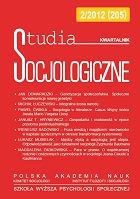Integralna teoria narodu
Integral Theory of Nation and Nationalism
Author(s): Michał ŁuczewskiSubject(s): Social Sciences
Published by: Instytut Filozofii i Socjologii Polskiej Akademii Nauk
Keywords: theory of nation and nationalism; constructivism; modernism; ethno-symbolism; methodology of social sciences
Summary/Abstract: This article sets out to formulate an integral theory of nation and nationalism. Drawing on the following criteria of a good sociological theory: (a) integration with other theories; (b) dynamism and (c) flexibility, it goes on to apply them to nationalism studies. This procedure allows to construct both a definition of nation (understood as a social movement of activists externalizing, objectivizing and internalizing national ideologies) as well as a full explanation of the phenomenon of nation (genetic explanation, combining micro and macro levels of analyses, i.e. environmental, relational and cognitive mechanisms), which together constitute the integral theory of nation and nationalism. The theory then serves to show limits of rival theories of nation and nationalism. First, it points to the fact that other theories are partial instead of integrated. In specific, they tend to focus on some elements of definition of the nation, while leaving other elements out of scope (for example, they focus on internalized or objectivized ideology, while omitting processes of negotiation of national ideology that belong to the level of externalization). The same goes for partial explanations of nation and nationalism, which neither take into account the need for an analysis of nation in historical perspective nor offer explanations which would combine environmental, relational and cognitive mechanisms. Second, the integral theory demonstrates certain instances of inflexibility of the partial theories of nation and nationalism, which leads to disregarding the problems instead of dealing with them. An important case in point here is a modernist theory, as represented by Ernest Gellner, which treats ethnic origins of nations not as a challenge to its basic premises but as an anomaly. Finally, the integral theory allows to construct new explanations of nation-building (for example: nationalization of peasant masses in Polish Galicia was not an outcome of revolutionary movement, as it is customarily argued, but a product of traditionalist movements). It also helps to pose new questions. Instead of reducing national phenomena to more basic factors it invites analyses of nation and nationalism in the context of unintended effects.
Journal: Studia Socjologiczne
- Issue Year: 205/2012
- Issue No: 2
- Page Range: 27-46
- Page Count: 20
- Language: Polish

